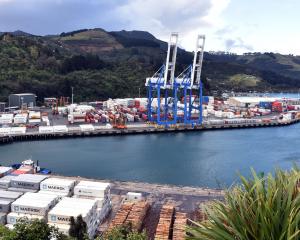Maersk is the world's largest container shipping line, operating 578 ships, and is Port Otago's largest customer, providing the lion's share of a record 219,000 containers handled last financial year.
Port Otago has applied for numerous resource consents to dredge and dump more than 7 million cu m of sand and silts over several years, with the submission date extended and a hearing expected to be in early April.
There are expected to be searching submissions from environmentalists and recreational harbour and beach users on impact assessments.
Port Otago management met Maersk New Zealand managing director Julian Bevis yesterday, who later said the "main focus" for Port Otago at present is its channel dredging application.
"It [widening and deepening] is definitely the right thing for Port Chalmers to be doing . . . and it is sensible to be doing it in a series of moves," Mr Bevis said.
Most container ships at present visiting Port Chalmers are a 4100 Teu [twenty-foot equivalents] class, with Mr Bevis saying the next size would be 5000 to 5500 classes, and eventually 8000 Teu class vessels.
Mr Bevis acknowledged Port Otago would get "no assurances" of Maersk patronage in the future and but said if Port Otago "continues to perform the way it has, then it's more likely we will stay".
There were "no changes planned" for schedules and vessels for Port Otago in the foreseeable future, Mr Bevis said.
He defended Maersk's position, and said the perception shipping line patronage defined the status of any given port was "overstated".
Maersk "followed the cargo and adjusted [export schedules] accordingly" and was otherwise "service provider" for exporters.
"We build bigger ships with no [supply] guarantees. Yes, it is going to be a risk [for Port Otago] but businesses have to reinvest in themselves," Mr Bevis said after the meeting with Port Otago.
During the informal talks with Port Otago yesterday, Mr Bevis said all New Zealand ports, including Port Chalmers, had to improve container turnaround times, but he also acknowledged ports' criticism Maersk itself had first to "provide better vessel planning" systems, to have ships in port on scheduled times.
While Maersk is putting on up to seven extra vessels to offset the peak period of seasonal agricultural exports out of New Zealand, Mr Bevis said the only expected "squeeze on space" will be when there are increased transtasman cargoes contributing to rebuilding in Australia; ranging from construction through to retail supplies.
Mr Bevis said following a "frightful" financial year in 2009, when Maersk globally ran at a loss of around $US2 billion ($NZ2.64 billion), each of the first three quarters of the present financial year had rebounded into profit.
He expected operations in general to be up in profit by 10%-15%, largely driven by company cost reductions, including reviews of processes and systems and large fuel savings made through slower ship speeds around the globe.
Aside from minor disruptions of coastal "hubbing" of Middle Eastern cargoes, neither the geopolitical events in Egypt and subsequent concerns over the Suez Canal operations nor the recent Queensland floods affected Maersk's New Zealand customer base, he said.





